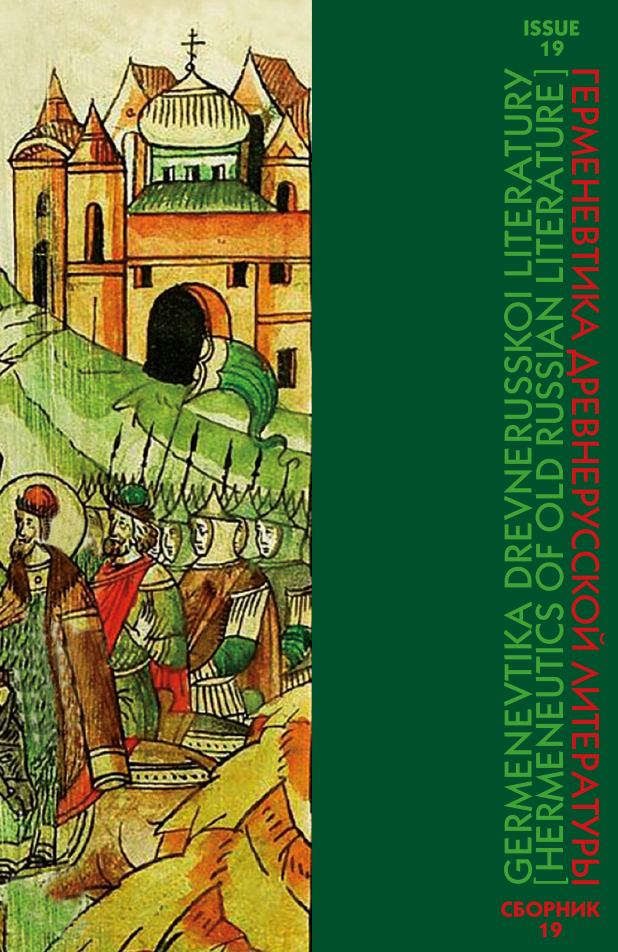Abstract:
The article analyzes six original works by St. Maxim the Greek, which are joined in the Parisian manuscript collection in a unique way. They all share the theme of monastic life and are composed in the form of answers. It turns out that it was in these works that Maxim the Greek created a special concept of “inner man”. Rather, traces of his personal practice of “prayer of the heart” (Jesus Prayer) can be detected, which bears testimony to his monastic experience and worldview that bring to mind the spiritual ascetic practice of hesychasm. Moreover, the mentioned works of St. Maxim the Greek include essential techniques for creating a literary text, thus reflecting not only his understanding of literary creativity, but also the essence of poetics of St. Maxim the Greek. It is for the first time that these works are examined in such a detail and on the basis of handwritten materials.
References:
- Verner, I.V. “Grammaticheskaia sprava Maksima Greka v Psaltyri 1552 g.” [“The Grammatical Editing of Maximus the Greek in the Psalter of 1552”]. Pis’mennost’, literatura, fol’klor slavianskikh narodov. Istoriia slavistiki. XV Mezhdunarodnyi s”ezd slavistov [Writing, Literature, Folklore of the Slavic Peoples. History of Slavic Studies. XV International Congress of Slavists]. Moscow, Drevlekhranilishche Publ., 2013, pp. 104–127. (In Russian)
- Kloss, B.M. “Maksim Grek — perevodchik Povesti Eneia Sil’viia Pikkolomini ‘Vziatie Konstantinopolia turkami’.” [“Maximus the Greek — Translator of the Story of Aeneas Silvius Piccolomini ‘The Сapture of Constantinople by the Turks’.”]. Pamiatniki kul’tury. Novye otkrytiia. Pis’mennost’. Iskusstvo. Arkheologiia. Ezhegodnik 1974 [The Monuments of Culture. New Discoveries. Writing. Art. Archeology. Yearbook 1974]. Moscow, Nauka Publ., 1975, pp. 55–61. (In Russian)
- Kravets, E.V. “Knizhnaia sprava i perevody Maksima Greka kak opyt normalizatsii tserkovnoslavianskogo iazyka XVI veka” [“Book Editing and the Translations of Maximus the Greek as an Experience of Normalizing the Church Slavonic Language of the 16th Century”]. Russian Linguistics, vol. 15, 1991, pp. 247–279. (In Russian)
- Prepodobnyi Maksim Grek. Sochineniia [Ven. Maximus the Greek. Oeuvre], vol. 1. Moscow, Indrik Publ., 2008. 568 p. (In Russian)
- Prepodobnyi Maksim Grek. Sochineniia [Ven. Maximus the Greek. Oeuvre], vol. 2. Moscow, Rukopisnye pamiatniki Drevnei Rusi, 2014. 432 p. (In Russian)
- Prokhorov, G.M. “Tak vossiiaiut pravedniki...”: Vizantiiskaia literatura XIV v. v Drevnei Rusi [“Thus will the Righteous Shine...”: Byzantine Literature of the 14th Century in Old Russia]. St. Petersburg, Izdatel’stvo Olega Abyshko Publ., 2009. 265 p. (In Russian)
- Semiachko, S.A. “Rukopis’ F. I. 738 kak sbornik postoiannogo sostava.” “Prilozhenie Predisloviia k bibleiskim pesniam” [“Manuscript F. I. 738 as a Collection of Permanent Appendix 1. Prefaces to Bible Songs”]. Gordienko, E.A., and Semiachko, S.A., and Shibaev, M.A. Miniatiura i tekst: (iz istorii odnoi rukopisi) [Miniature and Text: (from the History of One Manuscript)]. St. Petersburg, Izdatel’stvo “Pushkinskii dom” Publ., 2011, pp. 124–162, 208–227. (In Russian)
- Sinitsyna, N.V. Maksim Grek v Rossii [Maximus the Greek in Russia]. Moscow, Nauka Publ., 1977. 332 p. (In Russian)
- Sinitsyna, N.V. “Rannee tvorchestvo Maksima Greka” [“The Early Works of Maximus the Greek”]. Prepodobnyi Maksim Grek. Sochineniia [Ven. Maximus the Greek. Oeuvre] vol. 1. Moscow, Indrik Publ., 2008, pp. 15–83. (In Russian)
- Sinitsyna, N.V. “Tvorchestvo prepodobnogo Maksima Greka 30–50 gg. XVI v. i sobranie izbrannykh sochinenii iz 47 glav” [“Creativity of the Monk Maximus the Greek of 1530s–1550s and a Collection of Selected Works from 47 Chapters”]. Prepodobnyi Maksim Grek. Sochineniia [Ven. Maximus the Greek. Oeuvre], vol. 2. Moscow, Rukopisnye pamiatniki drevnei Rusi Publ., 2014, pp. 12–47. (In Russian)
- Cameron, А. The Byzantines. Cambridge, John Wiley & Sons, 2009. 296 p. (In English)
- Davis, L.D. The First Seven Ecumenical Councils (325–787): Their History and Theology. Washington, Michael Glazier, 1988. 342 p. (In English)
- Denissoff, Е. Maxime le Grec et L’Occident: Contribution a L’Histoire de la Pensee Religieuse et Philosophique de Michel Trivolis. Louvain, Bibliotheque de l’Universite, 1943. 460 p. (In French)
- Hay, D., and Law, J. Italy in the Age of the Renaissance 1380–1530. London and New York, Longman Pub Group, 1989. 372 p. (In English)
- Janin, R. Les Eglises Orientales et les Rites Orientaux. 4. ed. Paris, Letouzey et Ané, 1955. 548 p. (In French)
- Kallendorf, C.W. (ed. and trans.) Humanist Educational Treatises. Cambridge, Mass., Harvard University Press, 2002. 358 p. (In English)
- Krausmüller, D. Theotokos-Diadochos. Byzantine Orthodoxies. Papers from the Thirty-sixth Spring Symposium. Aldershot, 2006, pp. 35–54. (In English)
- Reinert, S.W. Fragmentation (1204–1453). The Oxford History of Byzantium, Ed. Cyril Mango. Oxford, Oxford University Press, 2002, pp. 248–284. (In English)
- Simoniti, P. Humanizem na Slovenskem in slovenski humanisti do srede XVI. stoletja. Ljubljana, Slovenska matica, 1979. 297 p. (In Slovenian)
- Valiavitcharska, V. Rhetoric and Rhythm in Byzantium. The Sound of Persuasion. Cambridge, Cambridge University Press, 2013. 243 p. (In English)
- Zajc, N. Some Notes on the Life and Works of Maxim the Greek (Michael Trivolis, ca 1470 — Maksim Grek, 1555/1556). Part 2: Maxim the Greek’s Slavic Idiolect. Scrinium: Revue de patrologie, d’hagiographie critique et d’histoire ecclésiastique. 2016 (12), pp. 375–382. (In English) DOI: 10.1163/18177565-00121p24






